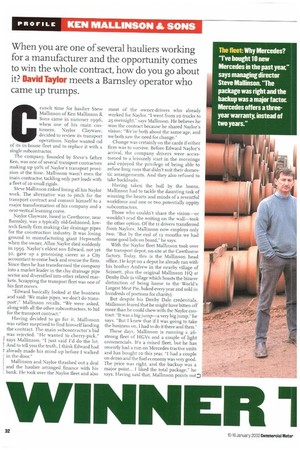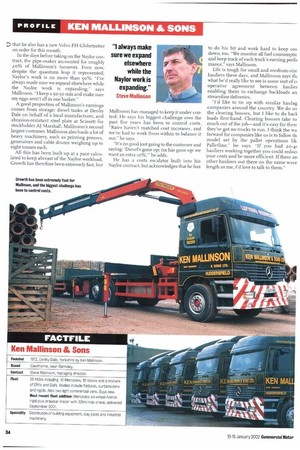When you are one of several hauliers working for a
Page 32

Page 34

If you've noticed an error in this article please click here to report it so we can fix it.
manufacturer and the opportunity comes to win the whole contract, how do you go about it? David Taylor meets a Barnsley operator who came up trumps.
Crunch time for haulier Steve Mallinson of Ken Mallinson & Sons came in summer 1996, when one of his main customers, Naylor Clayware, decided to review its transport operations. Naylor wanted rid of its in-house fleet and to replace it with a single subcontractor.
The company, founded by Steve's father Ken, was one of several transport contractors making up 50% of Naylor's transport provision at the time. Mallinson wasn't even the main contractor, tackling only part loads with a fleet of to small rigids.
Steve Mallinson risked losing all his Naylor work. The alternative was to pitch for the transport contract and commit himself to a major transformation of his company and a near-vertical learning curve.
Naylor Clayware, based in Cawthorne, near Barnsley, was a typically old-fashioned, lowtech family firm making clay drainage pipes for the construction industry. It was losing ground to manufacturing giant Hepworth when the owner, Allan Naylor died suddenly in 1995. Naylor's eldest son Edward, not yet 30, gave up a promising career as a City accountant to come back and rescue the firm. Since then he has transformed the company into a market leader in the clay drainage pipe sector and diversified into other related markets. Scrapping the transport fleet was one of his first moves.
"Edward basically looked at the business and said: 'We make pipes, we don't do transport'," Mallinson recalls. "We were asked, along with all the other subcontractors, to bid for the transport contract."
Having decided to go for it, Mallinson was rather surprised to find himself landing the contract. The main subcontractor's bid , was rejected. "He wanted to cherry-pick," :I says Mallinson. "I just said I'd do the lot. E ) And to tell you the truth, I think Edward had
7 already made his mind up before I walked in the door."
; Mallinson and Naylor thrashed out a deal -,' and the haulier arranged finance with his : bank. He took over the Naylor fleet and also most of the owner-drivers who already worked for Naylor. "I went from io trucks to 25 overnight," says Mallinson. He believes he won the contract because he shared Naylor's vision: "We're both about the same age, and we both saw the need for change."
Change was certainly on the cards if either firm was to survive. Before Edward Naylor's arrival, the company drivers were accustomed to a leisurely start in the mornings and enjoyed the privilege of being able to refuse long runs that didn't suit their domestic arrangements. And they also refused to take backloads.
Having taken the bull by the horns, Mallinson had to tackle the daunting task of winning the hearts and minds of a resentful workforce and one or two potentially uppity subcontractors.
Those who couldn't share the vision—or wouldn't read the writing on the wall—took the other option. Of the ri drivers transferred from Naylors, Mallinson now employs only two. "But by the end of 12 months we had some good lads on board," he says.
With the Naylor fleet Mallinson took over the transport depot, on-site at the Cawthorne factory. Today, this is the Mallinson head office, He kept on a depot he already ran with his brother Andrew in the nearby village of Scissett, plus the original Mallinson HQ at Denby Dale (a village which boasts the bizarre distinction of being home to the World's Largest Meat Pie, baked every year and sold in hundreds of portions for charity).
But despite his Denby Dale credentials, Mallinson feared that he might have bitten off more than he could chew with the Naylor contract. "It was a big jump—a very big jump," he says. "But I knew that if I was going to take the business on, I had to do it there and then."
These days, Mallinson is running a z6• strong fleet of HGVs and a couple of light commercials. It's a mixed fleet, but he has recently had a run on Mercedes tractive units and has bought to this year. "I had a couple on demo and the fuel economy was very good. The price was right, and the backup was a major point... I liked the total package," hc says. Having said that, Mallinson points out) D that he also has a new Volvo FH Globetrotter on order for this month.
In the days before taking on the Naylor contract, the pipe-maker accounted for roughly 20% of Mallinson's turnover. Even now, despite the quantum leap it represented, Naylor's work is no more than 50%. "I've always made sure we expand elsewhere while the Naylor work is expanding," says Mallinson, "I keep a 50-50 mix and make sure my eggs aren't all in one basket."
A good proportion of Mallinson's earnings comes from storage: diesel tanks at Denby Dale on behalf of a local manufacturer, and abrasion-resistant steel plate at Scissett for stockholder AJ Marshall, Mallinson's second largest customer. Mallinson also hauls a lot of heavy machinery, such as printing presses, generators and cable drums weighing up to eight tonnes each.
All this has been built up at a pace calculated to keep abreast of the Naylor workload. Growth has therefore been extremely fast, but Mallinson has managed to keep it under control. He says his biggest challenge over the past five years has been to control costs. "Rates haven't matched cost increases, and we've had to work from within to balance it out," he says.
"It's no good just going to the customer and saying: 'Diesel's gone up; tax has gone up: we want an extra io%," he adds.
He has a costs escalator built into his Naylor contract, but acknowledges that he has to do his bit and work hard to keep cos down, too. "We monitor all fuel consumptic and keep track of each truck's earning perfo mance," says Mallinson.
Life is tough for small and medium-size hauliers these days, and Mallinson says th: what he'd really like to see is some sort of n operative agreement between hauliei enabling them to exchange backloads an streamline deliveries.
"I'd like to tie up with similar haulag companies around the country. We do us the clearing houses, but I like to do bad loads first-hand. Clearing houses take to much out of the job—and it's easy for there they've got no trucks to run. I think the wa forward for companies like us is to follow th model set by the pallet operations Palletline," he says. "If you had 20-4( hauliers working together you could reduo your costs and be more efficient. If there an other hauliers out there on the same wave length as me, I'd love to talk to them."
















































































































































